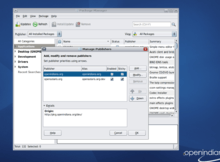illumos
 | |
| Developer | illumos Foundation |
|---|---|
| Written in | C |
| OS family | Unix (System V Release 4)[1] |
| Working state | Current |
| Source model | Open source with closed source binary blobs, targeted fully open source |
| Initial release | 2010 |
| Available in | English |
| Platforms | IA-32, x86-64, SPARC, ARM (under development)[2] |
| Kernel type | Monolithic |
| License | BSD, MIT or CDDL |
| Official website |
www |
illumos is a free and open-source Unix operating system. It derives from OpenSolaris, which in turn derives from SVR4 UNIX and Berkeley Software Distribution (BSD). illumos comprises a kernel, device drivers, system libraries, and utility software for system administration. This core is now the base for many different open-sourced OpenSolaris distributions,[3] in a similar way in which the Linux kernel is used in different Linux distributions.
The maintainers write illumos in lowercase since some computer fonts do not clearly distinguish a lowercase L from an uppercase i (see homoglyph). The name is derived from the Latin illuminare meaning "to enlighten," and "OS" for 'operating system'.
Overview

illumos was announced via webinar[4] on Thursday, 3 August 2010, as a community effort of some core Solaris engineers to create a truly open source Solaris by swapping closed source bits of OpenSolaris with open implementations.[5]
The original plan explicitly stated that illumos would not be a distribution or a fork. However, after Oracle announced discontinuing OpenSolaris, plans were made to fork the final version of the Solaris ON kernel allowing illumos to evolve into a kernel of its own.[6]
As of 2010, efforts focused on libc, the NFS lock manager, the crypto module and many device drivers to create a Solaris-like OS with no closed, proprietary code. As of 2012, development emphasis includes transitioning from the historical compiler, Studio, to GCC.
illumos is lightly led by founder Garrett D'Amore and other community members/developers such as Bryan Cantrill and Adam Leventhal, via a Developers' Council.[7]
The illumos Foundation has been incorporated in the State of California as a 501(c)6 trade association, with founding board members Jason Hoffman (formerly at Joyent), Evan Powell (Nexenta), and Garrett D'Amore. As of August 2012 the foundation was in the process of formalizing its by-laws and organizational development.
At OpenStorage Summit 2010, the new logo for illumos was revealed, with official type and branding to follow over.[8]
Development
Its primary development project, illumos-gate, derives from OS/Net (aka ON), which is a Solaris kernel with the bulk of the drivers, core libraries, and basic utilities, similar to what is delivered by a BSD "src" tree. It was originally dependent on OpenSolaris OS/Net, but a fork was made after Oracle silently decided to close the development of Solaris and unofficially killed the OpenSolaris project.
Features
- ZFS, a combined file system and logical volume manager providing a high data integrity for very large storage capacities.
- Solaris Containers, (or Zones) a low overhead implementation of operating-system-level virtualization technology for x86 and SPARC systems.
- DTrace, a comprehensive dynamic tracing framework for troubleshooting kernel and application problems on production systems in real time
- Kernel-based Virtual Machine, (or KVM) a virtualization infrastructure. KVM supports native virtualization on processors with hardware virtualization extensions.
- OpenSolaris Network Virtualization and Resource Control, (or Crossbow) a set of features that provides an internal network virtualization and quality of service including: Virtual NIC (VNIC) pseudo-network interface technology, Exclusive IP zones, Bandwidth management, and flow control on a per interface and per VNIC basis.
Relatives
Current distributions
Distributions, at illumos.org[9]
- DilOS, with Debian package manager (dpkg+apt) and virtualization support, available for x86-64 and SPARC.[10]
- Dyson, derived from Debian using libc, and SMF init system.
- napp-it, ready to use and comfortable ZFS storageserver with a free Web-GUI that includes all functions for a sophisticated NAS or SAN appliance.[11]
- NexentaStor, distribution optimized for virtualization, storage area networks, network-attached storage, and iSCSI or Fibre Channel applications employing the ZFS file system.
- OmniOS, a self-hosting, minimalist Illumos-based release suitable for production deployment.[12]
- OpenIndiana, a distribution that is a continuation and fork in the spirit of the OpenSolaris operating system.
- OpenSXCE, distribution for developers and system administrators for IA-32/x86-64 x86 platforms and SPARC.[13]
- SmartOS, a distribution for cloud computing with Kernel-based Virtual Machine integration.
- Tribblix, retro style distribution with modern components, available for x86-64 and SPARC.[14]
- XStreamOS, a distribution for infrastructure, cloud, and web development.[15]
- v9os, a server-only, IPS-based minimal SPARC distribution.[16]
References
- ↑ "Register of Open Branded Products".
- ↑ Clulow, Joshua (25 October 2012). "Raspberry Pi Bring-Up". Illumos Foundation. Retrieved 14 November 2013.
- ↑ "Distributions".
- ↑ Garrett D'Amore (3 August 2010). "Illumos - Hope and Light Springs Anew - Presented by Garrett D'Amore" (PDF). illumos.org. Retrieved 3 August 2010.
- ↑ "Whither OpenSolaris? Illumos Takes Up the Mantle". Archived from the original on 26 September 2015.
- ↑ Garrett D'Amore (13 August 2010). "The Hand May Be Forced". Retrieved 14 November 2013.
- ↑ Deirdré Straughan (16 May 2012). "Illumos Developers' Council Meeting". illumos.org. Retrieved 13 August 2012.
- ↑ Garrett D'Amore (27 October 2010). "New Illumos logo". Retrieved 14 November 2013.
- ↑ "Distributions - illumos - illumos wiki".
- ↑ "DilOS". www.dilos.org. Retrieved 2016-02-26.
- ↑ "napp-it // webbased ZFS NAS/SAN appliance for OmniOS, OpenIndiana, Solaris and Linux :Downloads". www.napp-it.org. Retrieved 2016-02-26.
- ↑ "OmniOS".
- ↑ "OpenSXCE". www.opensxce.org. Retrieved 26 February 2016.
- ↑ "Tribblix". www.tribblix.org. Retrieved 2016-02-26.
- ↑ "XStreamOS". SourceForge. Retrieved 2016-02-26.
- ↑ "v9os". SourceForge. Retrieved 2016-07-30.
External links
- Official website
- OS/Net consolidation, source code community developed and maintained.